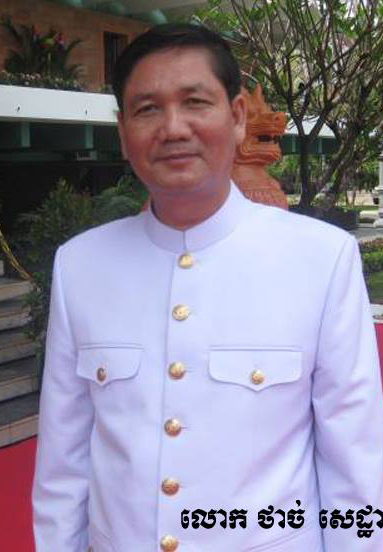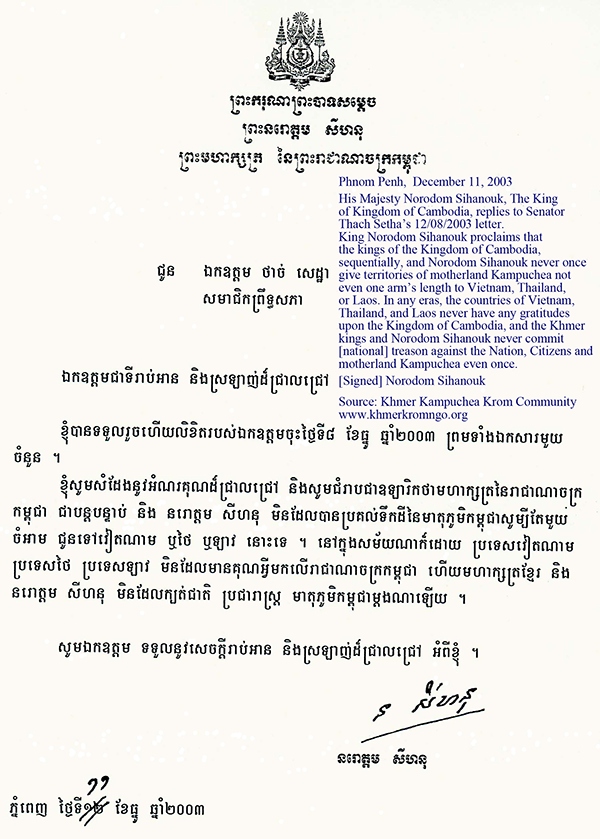|
ARCHIVES
CAMBODIA: Monastic code and due process violated in defrocking and deportation of a Buddhist monk
__________________________________________
FOR IMMEDIATE RELEASE
AS-152-2007
July 5, 2007
A Statement by the Asian Human Rights Commission
CAMBODIA: Monastic code and due process violated in defrocking and deportation of a Buddhist monk
On June 16, 2007, Venerable Buddhist Clergy Director Nun Nget wrote a letter to Supreme Buddhist Patriarch Tep Vong to seek his approval for the defrocking of Venerable Tim Sakhorn, who was officially appointed head monk of North Phnom Den monastery, Phnom Den commune, Kirivong District, Takeo province, in May 2002. Ven. Nun Nget claimed that Ven. Tim Sakhorn's “conduct was contrary to the Buddhist discipline and this misconduct impaired national and international solidarity, especially the solidarity between the two countries, Cambodia and Vietnam, when Ven. Tim Sakhorn had been using the monastery as a headquarter for propaganda and this act had been affecting the discipline and dignity of Buddhism.”
Ven. Nun Nget's letter did not, however, mention any evidence to support his allegations against Ven. Tim Sakhorn such as offences that Ven. Tim Sakhorn had allegedly committed, when and where these offences had been committed, and witnesses to these offences. Ven. Nun Nget also failed to mention the principles and procedures that he had followed before deciding to defrock Ven. Tim Sakhorn. No case report or case file was attached to the letter to support his request. Supreme Patriarch Tep Vong hastily approved the defrocking of Ven. Tim Sakhorn - just one day after the letter of request had been sent to him.
Ven. Tim Sakhorn was defrocked on 30 June. Immediately after the defrocking he was taken away in a car said to belong to a bodyguard of the Cambodian Prime Minister. Now, according to the Ministry of Interior, Tim Sakhorn, has been deported to Vietnam. He belonged to the indigenous Cambodian community in Vietnam, commonly known as Khmer Kampuchea Krom, from where he had emigrated to Cambodia in 1979.
The disciplining and defrocking of Ven. Tim Sakhorn were carried out in gross violation of the Buddhist monastic code, especially its section on Adhikarana-samatha, or the settlement of issues. This part of the code provides the principles and procedures relating to the equivalent of what the secular justice system calls a fair trial, for monks accused of having violated the Buddhist disciplinary system. Adhikarana-samatha stipulates, among other things, that an accused monk is to be tried by a community of peers to which he belongs or a committee of them, and that those monks can cross-examine the accused and the accused can defend himself. The same part of the code lists the various disciplinary measures that can be used against a guilty monk, which include, among other things, admission of a breach of discipline and promise not to repeat the act, probation and defrocking.
There was also no due process on the part of the authorities in the deportation of Tim Sakhorn to Vietnam. There was no investigation or trial to find out whether he broke any Cambodian law when he came to Cambodia in the first place, or when he was accused of using his monastery as the headquarters for a propaganda campaign, impairing national and international solidarity, especially solidarity between Cambodia and Vietnam.
The Asian Human Rights Commission (AHRC) is seriously concerned about the arbitrariness with which the defrocking and deportation of Tim Sakhorn was conducted. The Cambodian Buddhist leadership has itself failed to live up to the Buddhist monastic code and lacked Buddhist tolerance and compassion in its treatment of Tim Sakhorn. Their action against Tim Sakhorn has undermined the Buddhist values that they are supposed to promote. The deportation has breached a long-standing government policy of recognizing members of the Khmer Kampuchea Krom community living in Cambodia as Cambodian citizens. It has therefore violated the constitutional right of Cambodian citizens not be deported elsewhere. This deportation in violation of these principles has created fear amongst the Cambodian people and has undermined the rule of law in Cambodia.
The AHRC urges the Cambodian Buddhist leadership, namely, Nun Nget and Tep Vong, to halt the use of arbitrary disciplinary practices and abide by the Buddhist monastic code, and urges the Cambodian government to have recourse to due process and courts of law before punishing or deporting persons.
The AHRC is gravely concerned for the security and physical and psychological integrity of Tim Sakhorn since his deportation to Vietnam, and urges the Vietnamese government to guarantee his personal integrity and human rights at all times.
# # #
About AHRC: The Asian Human Rights Commission is a regional non-governmental organisation monitoring and lobbying human rights issues in Asia. The Hong Kong-based group was founded in 1984.
download English version
__________________________________________
__________________________________________
King Norodom Sihanouk Replies to Senator Thach Setha
12/11/03
His Majesty Norodom Sihanouk, The King of Kingdom of Cambodia, replies to Senator Thach Setha's 12/08/2003 letter. King Norodom Sihanouk proclaims that the kings of the Kingdom of Cambodia, sequentially, and Norodom Sihanouk never once give territories of motherland Kampuchea not even one arm's length to Vietnam, Thailand, or Laos. In any eras, the countries of Vietnam, Thailand, and Laos never have any gratitudes upon the Kingdom of Cambodia, and the Khmer kings and Norodom Sihanouk never commit [national] treason against the Nation, Citizens and motherland Kampuchea even once.
Source: KKC
download Khmer version
 |
 |
Click on image to zoom. |
| |
__________________________________________
The Khmer Kampuchea Krom Community (KKC) established by the will of the Khmer Kampuchea Krom people from every corner of the globe to protect the interest of Khmers from Kampuchea Krom in uniform to the evolution of national and international communities.
The Khmer Kampuchea Krom Community is an independent and non-governmental organization.
The Khmer Kampuchea Krom Community is a proud member of the Transnational Radical Party, an association of citizens, parliamentarians and members of government of various national and political backgrounds who intend to achieve, through nonviolent Gandhian methods, a number of concrete objectives aimed at creating an effective body of international law with respect for individuals and the affirmation of democracy and freedom throughout the world with headquarters in Europe. |
